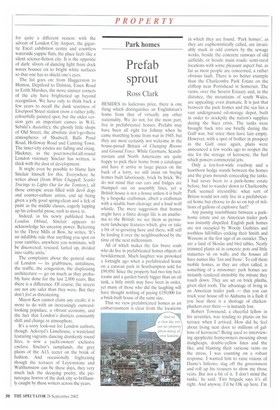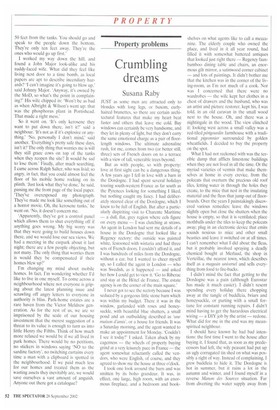Prefab sprout
Ross Clark
BESIDES its ludicrous price, there is one thing which distinguishes an Englishman's home from that of virtually any other nationality. We do not, for the most part, live in prefabricated homes. Prefabs may have been all right for Johnny when he came marching home from war in 1945, but they are most certainly not welcome in the house-proud Britain of Changing Rooms and Ground Force. While Germans, Scandinavians and North Americans are quite happy to pick their home from a catalogue and have it arrive in large pieces on the back of a lorry, we still insist on buying homes built laboriously, brick by brick. We do not mind that our cars and fridges are thumped out on assembly lines, yet a British house is not a house unless it is built by a bespoke craftsman, albeit a craftsman with a sizable bum cleavage and a loud wolf whistle. The mere suggestion that homes might have a finite design life is an anathema to the British: we sec them as permanent landscape features which, give or take a bit of re-grouting here and there, will still be lording it over the neighbourhood by the time of the next millennium.
All of which makes the few brave souls who do live in prefabricated homes objects of bewilderment. Much laughter was provoked a fortnight ago when a prefabricated home on a caravan park in Southampton sold for £99,950. Since the property had two tiny bedrooms and a garden barely bigger than an oil tank, a little mirth may have been in order, yet many of those who did the laughing will have thought nothing of paying £150,000 for a brick-built house of the same size.
That we view prefabricated homes as an embarrassment is clear from the locations
in which they are found. 'Park homes', as they are euphemistically called, are invariably stuck in odd corners by the sewage works, beside the concrete runways of old airfields, or beside main roads: semi-rural locations with some pleasant aspect but, as far as most people are concerned, a rather obvious fault. There is no better example than the Charlcombe Park Estate on the clifftop near Portishead in Somerset. The views, over the Severn Estuary and, in the distance, the mountains of south Wales, are appealing; even dramatic. It is just that between the park homes and the sea lies a vast underground oil-storage depot, built in order to stockpile the nation's supplies during the Suez crisis. The tanks were brought back into use briefly during the Gulf war, but since then have lain empty. However, with a spot of bother in prospect in the Gulf once again, plans were announced a few weeks ago to reopen the site for the storage of kerosene, the fuel which powers commercial jets.
Only a ten-foot-wide roadway and a hawthorn hedge stands between the homes and the grass mounds concealing the tanks. I had never been to a park-home estate before, but to wander down to Charlcombe Park seemed irresistible: what sort of Briton would not only live in a prefabricated home but choose to do so on top of millions of gallons of explosive fuel?
Any passing resemblance between a parkhome estate and an American trailer park was instantly dispelled. English park homes are not occupied by Woody Guthries and toothless hill-billies cocking their Smith and Wessons at the first sign of an outsider. They are a land of Skodas and bird tables. Neatly trimmed plants sit in concrete pots and little statuettes sit on walls, and the houses all have names like 'Jan and Irene'. To call them mobile homes, as they are often called, is something of a misnomer: park homes are instantly rendered immobile the minute they touch down. They are set on brick plinths, given tiled roofs. The advantage of living in an American trailer park — that you can truck your house off to Alabama in a flash if you hear there is a shortage of chickenpluckers over there — is instantly lost.
Robert Townsend, a cheerful fellow in his seventies, was tending to plants on his terrace when I arrived. How did he feel about living next door to millions of gallons of kerosene? Being used to interviewing apoplectic homeowners moaning about dungheaps, double-yellow lines and the like, and blaming their varicose veins on the stress, I was counting on a robust response. I wanted him to raise visions of Dante's Inferno, slag off the government and roll up his trousers to show me those veins. But not a bit of it. 'I don't mind the tanks,' he said. 'Fire brigade says it's all right. And anyway, I'd be OK up here. I'm
50 feet from the tanks. You should go and speak to the people down the bottom. They're only ten feet away. They're the ones who would go up first.'
I worked my way down the hill, and found a John Major look-alike and his ruddy-faced wife. What did they feel like living next door to a time bomb, as local papers are apt to describe incendiary hazards? 'I can't imagine it's going to blow up,' said Johnny Major. 'Anyway, it's owned by the MoD, so what's the point in complaining?. His wife chipped in: 'Won't be as bad as when Albright & Wilson's went up: that was the phosphorus plant in Portishead. That made a right mess.'
So it went on. 'It's only kerosene they want to put down there, isn't it? said a neighbour. 'It's not as if it's explosive or anything."No, personally I don't mind,' said another. 'Everything's pretty safe these days, isn't it? The only thing that worries me is will they still graze cows on top of the tanks when they reopen the site? It would be sad to lose them.' Finally, after much searching, I came across Ralph Salter, who was livid; so angry, in fact, that you could almost feel the floor of his mobile home rocking on its plinth. 'Just look what they've done,' he said, passing me the front page of the local paper. They've overexposed my photograph. They've made me look like something out of a horror movie. Oh, the kerosene tanks,' he went on. 'No, it doesn't concern me.
'Apparently, they've got a control panel which allows them to shut everything off if anything goes wrong. My big worry was that they were going to build houses down there, and we would lose our sea views. We had a meeting in the carpark about it last night; there are a few people objecting. but not many. The only thing that worries them is would they be compensated if their homes blew up?'
I'm changing my mind about mobile homes. In fact, I'm wondering whether I'd like to live in one myself. To come across a neighbourhood where not everyone is griping about the latest planning issue and scrawling off angry letters to everyone in authority is bliss. Park-home estates are a rare haven from the Victor Meldrew generation. As for the rest of us, we are so imprisoned by the scale of our housing investment that the merest suggestion of a threat to its value is enough to turn us into little Henry the Fifths. Think of how much more relaxed we would be if we all lived in park homes. There would be no petitions, no stickers in windows saying 'NO to the sardine factory', no twitching curtains every time a man with a clipboard is spotted in the neighbourhood. If we paid much less for our homes and treated them as the wasting assets they inevitably are, we would save ourselves a vast amount of anguish. Anyone out there got a catalogue?



































































































 Previous page
Previous page